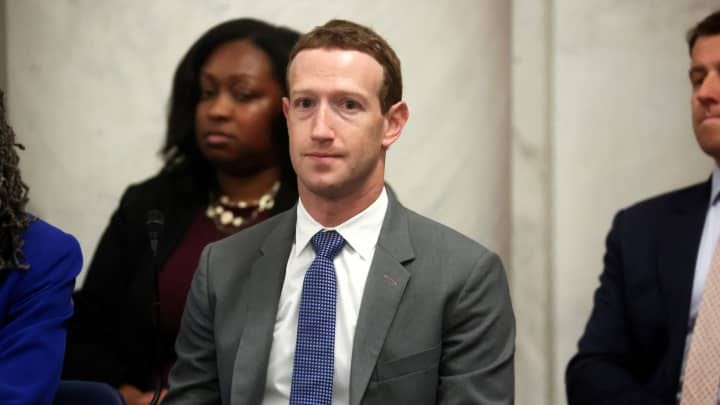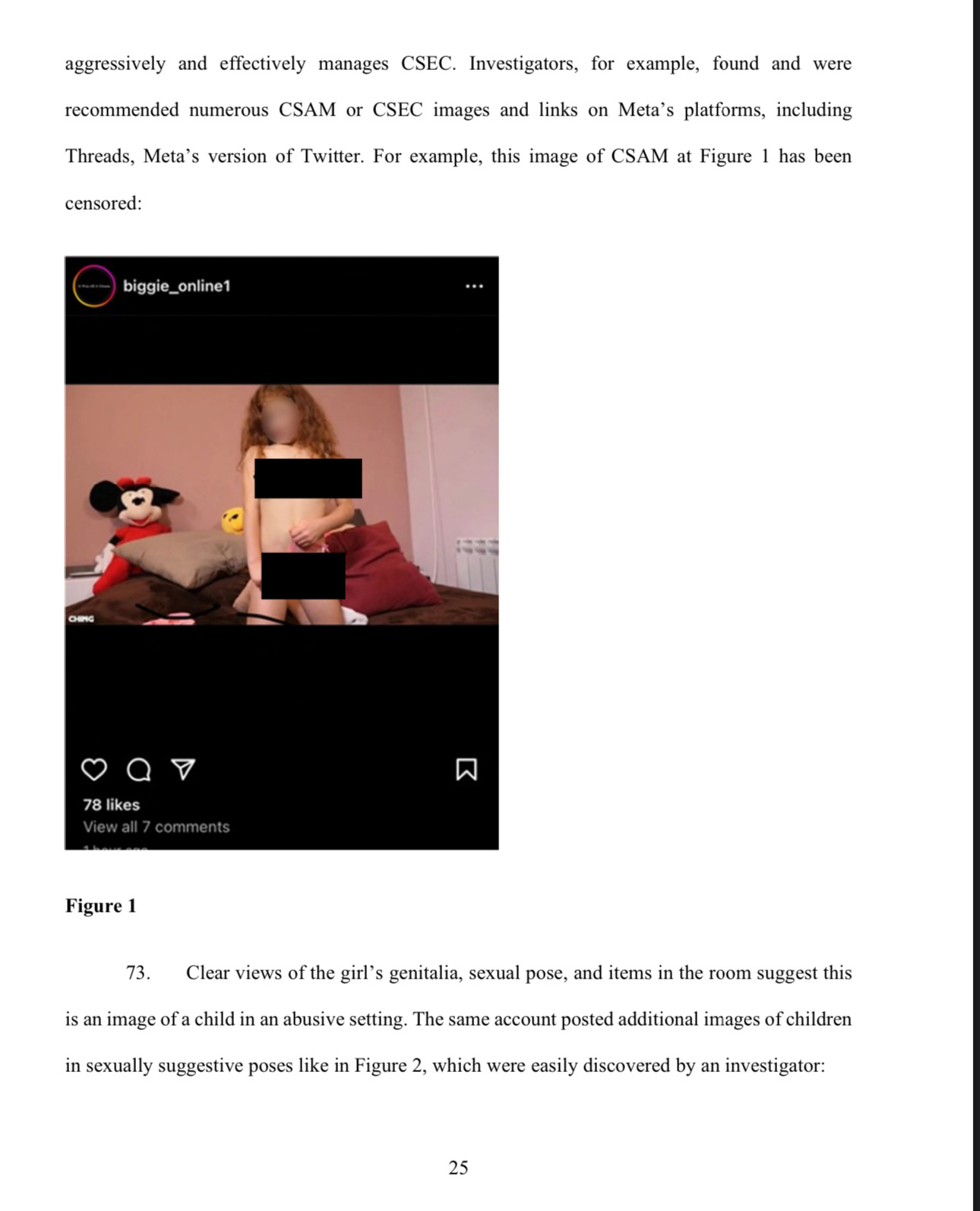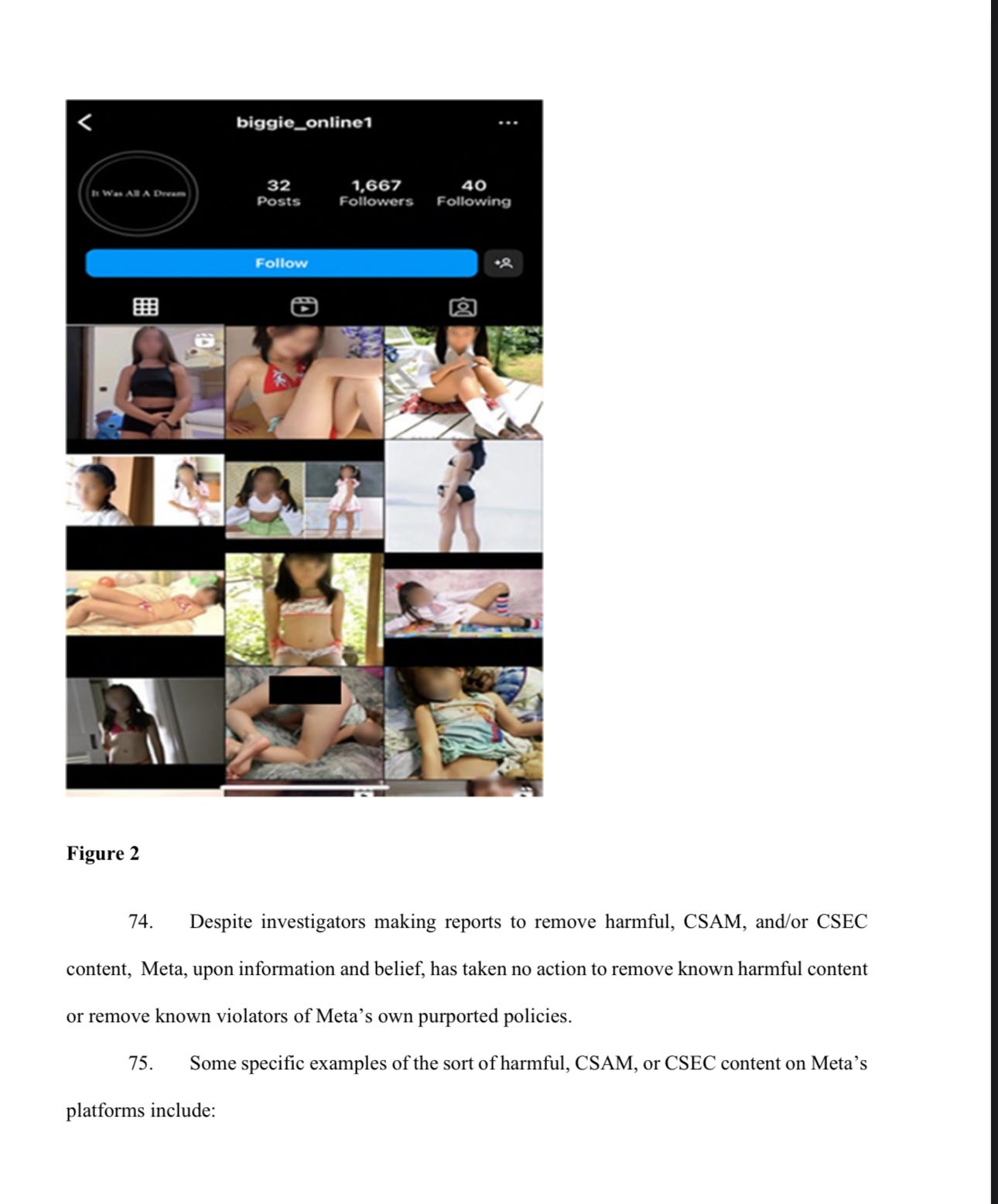🚨Attorney General Raúl Torrez Files Lawsuit Against Meta Platforms and Mark Zuckerberg to Protect Children from Sexual Abuse and Human Trafficking
Today, Attorney General Raúl Torrez filed a lawsuit against Meta Platforms, Inc., Chief Executive Officer Mark Zuckerberg, and the company’s wholly-owned subsidiaries — including Instagram, LLC and Facebook Holdings, LLC — to protect children from sexual abuse, online solicitation, and human trafficking.
“Our investigation into Meta’s social media platforms demonstrates that they are not safe spaces for children but rather prime locations for predators to trade child pornography and solicit minors for sex,” said Attorney General Torrez. “As a career prosecutor who specialized in internet crimes against children, I am committed to using every available tool to put an end to these horrific practices and I will hold companies — and their executives — accountable whenever they put profits ahead of children’s safety.”
Over the past few months, the New Mexico Attorney General’s Office carried out an undercover investigation of Meta’s platforms, creating decoy accounts of children 14-years and younger. The Office gathered evidence that those platforms have:
Proactively served and directed the underage users a stream of egregious, sexually explicit images — even when the child has expressed no interest in this content
Enabled dozens of adults to find, contact, and press children into providing sexually explicit pictures of themselves or participate in pornographic videos.
Recommended that the children join unmoderated Facebook groups devoted to facilitating commercial sex.
Allowed Facebook and Instagram users to find, share, and sell an enormous volume of child pornography.
Allowed a fictitious mother to offer her 13-year-old daughter for sale to sex traffickers and to create a professional page to allow her daughter to share revenue from advertising.
“Mr. Zuckerberg and other Meta executives are aware of the serious harm their products can pose to young users, and yet they have failed to make sufficient changes to their platforms that would prevent the sexual exploitation of children,” AG Torrez added. “Despite repeated assurances to Congress and the public that they can be trusted to police themselves, it is clear that Meta’s executives continue to prioritize engagement and ad revenue over the safety of the most vulnerable members of our society.”
Meta’s platforms Facebook and Instagram are a breeding ground for predators who target children for human trafficking, the distribution of sexual images, grooming, and solicitation. Teens and preteens can easily register for unrestricted accounts because of a lack of age verification. When they do, Meta directs harmful and inappropriate material at them. It allows unconnected adults to have unfettered access to them, which those adults use for grooming and solicitation. And Meta’s platforms do this even though Meta has the capability of both determining that these users are minors and providing warnings or other protections against material that is not only harmful to minors but poses substantial dangers of solicitation and trafficking. For years, Meta has been on notice from both external and internal sources of the sexual exploitation dangers its platforms present for children but has nonetheless failed to stem the tide of damaging sexual material and sexual propositions delivered to children. In short, Meta has allowed Facebook and Instagram to become a marketplace for predators in search of children upon whom to prey. Meta’s conduct is not only unacceptable; it is unlawful. This action seeks to force Meta to institute protections for children because it refuses to do so voluntarily.
Simultaneously with its knowing failure to curb the sexual exploitation of children on its platforms, Meta targeted the age-based vulnerabilities of children by adopting algorithms and platform designs that are addictive to young users. Meta knowingly sought to maximize teen 2 engagement on its platforms. It chose to implement features such as engagement-based feeds, infinite scroll, push notifications, ephemeral content, and auto play video designed to increase the amount of time young users spend on its platforms while inhibiting the ability of those users to self-regulate. Meta’s platforms are the social media equivalent of an addictive drug from which young users cannot break free. Meta knew that these design features fostered addiction, anxiety, depression, self-harm, and suicide among teens and preteens. But Meta and its CEO rejected repeated internal proposals, and external pressures, to implement protections against youth mental health harm. Further, Meta selected a metric by which it measures conduct violative of its Community Standards policies that it knows to grossly underreport harmful material on its platforms, and Meta uses this metric to make misrepresentations about the safety of its platforms for young users.
As outlined in today’s filing, Meta fails to remove Child Sexual Abuse Material (CSAM) across its platforms and enables adults to find, contact, and solicit underage users to produce illicit pornographic imagery and participate in commercial sex. The New Mexico Attorney General’s complaint also details how Meta harms children and teenagers through the addictive design of its platform, degrading users’ mental health, their sense of self-worth, and their physical safety.
The Office’s investigators found that certain child exploitative content is over ten times more prevalent on Facebook and Instagram than it is on Pornhub and OnlyFans. Moreover, while the images and case studies included in the complaint are shocking, the New Mexico Attorney General’s Office excluded many images its investigators found on Meta’s platforms from the complaint because they were deemed too graphic and disturbing. Nonetheless, the complaint opens with a black box warning regarding the censored sexually explicit and self-harm images that are included.
Meta profits from its exposure of young users to harmful material and its refusal to implement design features that would protect children from sexual exploitation and mental health harm. It does so not by charging children for accessing its platforms but instead by monetizing, in the form of targeted advertising, the data that Meta gathers about its young users and their usage. Meta’s “targeted” advertising program allows advertisers to direct advertisements to consumers more precisely than would otherwise be possible using traditional media. This arrangement has proved particularly lucrative for Meta. The company reported more than $116 billion in revenue in 2022, and $117 billion the year before. As Meta’s financials confirm, all or substantially all of this revenue is attributable to advertising and enhanced by its user-data-driven ability to target advertising.
Meta’s platforms must maintain massive user bases in order to generate its target revenue. Meta must not only attract new users year over year, but it must ensure that existing users 3 remain on its platforms. If users leave Facebook or Instagram, if new users refuse to join altogether, or if these users spend less time on its platforms, Meta’s revenues will suffer as it would have less private data, and fewer users, to sell. As Meta warns investors in its annual SEC filings, “If we fail to retain existing users or add new users, or if our users decrease their level of engagement with our products, our revenue, financial results, and business may be significantly harmed.”
Meta’s business model of profit over child safety and business practices of misrepresenting the amount of dangerous material and conduct to which its platforms expose children violates New Mexico law. Meta should be held accountable for the harms it has inflicted on New Mexico’s children and be required to make its platforms as safe for children as the law requires.
Parents and children who have grappled with sexual exploitation enabled by social media platforms, as well as those who have experienced addiction, depression, eating disorders or other self-harm or mental health issues because of their use of social media, are encouraged to come forward to share their experiences with the Attorney General’s Office. Resources for getting help can be found here.
To read a copy of the complaint please clickhere.





A total ban on Facebook, Instagram any other social media platforms doing this